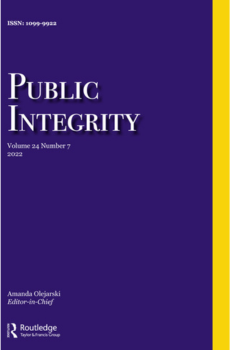Thank you for your message. The IPPA team will get back to you shortly. You first need to login here.



The Paradox of Anti-Corruption Policy Formulation, Adoption, and Implementation in Contexts of Systemic Corruption
Anti-corruption policies in contexts of systemic corruption--or environments where corruption is pervasive, normalized and socially accepted--face a special kind of policy paradox: these policies require change from the very actors responsible for their implementation. In these contexts, anti-corruption policies consistently fail, and are often used for other purposes, such as furthering the control of those it is supposed to restrain. Under conditions of systemic corruption, promises to address this problem fall under a special kind of policy paradox. Referred to in the literature as super-wicked problems, these problems are characterized as having to solve an impossible conundrum: one where those who need to change may not be willing to be effective, and those who oversee policies’ design and implementation might like to open the possibility for failure.
This Special Issue aims to provide some light into the fundamental question of why and how polities where corruption is the rule establish anti-corruption policies, to help us understand why these policies often fail. Existing theoretical approaches still leave ample room to explain the phenomenon for developing countries and the Global South under policy theoretical lenses and/or neo-institutionalist perspectives. At the same time, the answers to the question will advance theoretical frameworks by looking at the particularities of a kind of policy problem where a special kind of paradox persists. To name a few examples:
The wickedness of problems may be closest related to the institutional capacity of the State, rather than its inherent wickedness. For instance, in the drug policy frameworks the degree of wickedness of the problem is a result of the government structure and its institutional (in)capacity. A theoretical proposition behind the design, structure, and form of anti-corruption policies is shaped by the extant capacity to address the political controversy and the cognitive challenge of solving problems.
Policy studies can also contribute to understanding the form of anti-corruption policies. In a policy subsystem, amid a policy debate, the timing of a series of corruption scandals--in this case an “endogenous” shock-- could jeopardize (or not) the stalemate between antagonist actors, rebalancing the equilibrium in favor of a coalition that produces a policy change or the adoption and implementation of a certain set of anti-corruption policies.
Scandals could serve as triggering events with positive feedback that, in line with the Punctuated Equilibrium Theory, could break the stability of policies by producing change. Long-lasting equilibriums being breached by episodes in history, bringing sudden change, are explained by both the force of the uprising event combined with the inherent friction of the system; friction that is associated with its organizational features and capacities.
Who is the policy target where corruption is systemic? How has the polity socially constructed the policy target of anti-corruption policies? In places where corruption is endorsed by the system, corruption becomes the main and most important form of social advancement; it is actually a peer-accepted strategy. Therefore, the cultural notion of “those who do not cheat do not advance” is brain wired as a sound formal institution. What happens if such a cognitive appraisal of corruption is modified to allow people to revisit themselves as victims of these acts? A possibility to mitigate systemic corruption could pass through the social manipulation of the construction of policy targets, but is there any evidence of it in the real world?
This Special Issue aims to contribute to both theory and practice. Qualitative and mixed-methods, in-depth studies from the Global South and other understudied settings, are especially encouraged to submit their work. We seek to encourage more in-depth work of anti-corruption policy in these contexts, in order to gain a more contextualized understanding regarding the mechanisms surrounding anti-corruption policy formulation and implementation, and a more nuanced understanding of why these policies many times fail.
This Special Issue aims to align to the main objectives of Public Integrity by furthering understanding of public policy in environments characterized by systemic corruption.
All submissions will be reviewed on their merits.
More details on the website : here


Thank you for your message. The IPPA team will get back to you shortly. You first need to login here.